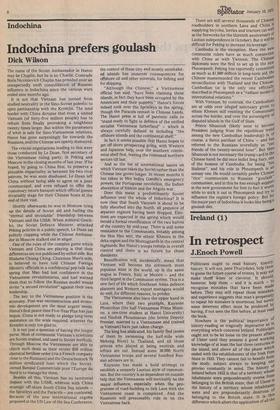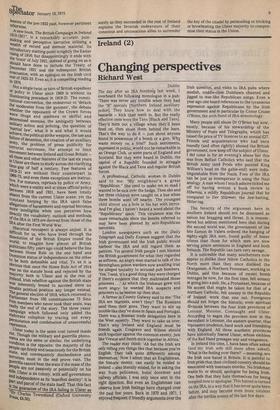In retrospect
J.Enoch Powell
Politicians ought to read history, historY, history. It will not, pace Thucydides, help the to guess the future course of events. It may ntIt make theeligiser or cleverer. It should. however, help them — and it is much — t° recognise mistakes that have been made before. They may still repeat those mistakes, and experience suggests that man's propensity to repeat his mistakes is enormous; but surelY some deterrent effect must be produced bY, having, if not seen the film before, at least reao the book. Nowhere is the political importance of history-reading so tragically imperative as in everything which concerns Ireland. Politicians ought not to be let loose on the present affairs of Ulster until they possess a good working knowledge of at least the last three centuries the island, and above all of the phase which ended with the establishment of the Irish Free State in 1922. They cannot fail to benefit from the study, subject always to keeping one, proviso constantly in mind. The history °I Ireland before 1922 is that of a territory whoSe inhabitants were preponderantly averse fro° belonging to the British state; that of Ulster is the history of a territory whose inhabitant!, were and are preponderantly desirous °I belonging to the British state. It is this difference which alters the application of all the
The
Spectator January 10, 1975
lessons of the pre-1922 past, however pertinent otherwise.
A new book, The British Campaign in Ireland 1919-1921*, is a remarkably accurate, pain
Staking and perceptive narrative utilising a
wealth of record and memoir material. Its introductory starting-point is rightly the Easter rising of 1916; but disappointingly it ends with the 'truce' of July 1921, instead of going on as it Should have done to include the Treaty of December 1921 and the subsequent British evacuation, with an epilogue on the Irish civil war of 1922-23. Even so, it is compelling reading in 1976.
Not a single twist or turn of British expedient or Policy in Ulster since 1969 is without its
illuminating precedent in 1919-21. The constitutional convention, the endeavour to 'detach the moderates from the gunmen', the debate Whether the opponents of the Crown forces were thugs and madmen or skilful and .determined enemies, the ambiguity between Military action and policing, the question of 'Martial law', what it is and what it would achieve, the political strike weapon, the use and failure of detention, the creation of an auxiliary army, the problem of press publicity for terrorist successes, the attempt to limit movement between Ireland and Great Britain — adl these and other features of the last six years in Ulster are there to study across the clarifying time-gap of half a century. Few features of 1919-21 are without their counterpart in 1969'75, and even these exceptions are instructive. For instance, reprisals by police or Army, Which were a reality and at times official policy between 1919 and 1921, have been totally absent from the current Ulster scene; yet the Constant harping by the IRA upon false allegations of harassment and reprisal becomes More intelligible when one perceives how directly the vocabulary, outlook and methods Of the IFtA in 1975 are derived from those of the IRA after the First World War. Historical retrospect is always unjust. It is difficult for us, who have lived through the dissolution of the British Empire round the World, to imagine how almost all British Politicians fifty years ago could believe the line between Home Rule on the one hand and Dominion status or independence on the other to be both defensible and vital. To us it is obvious that once the Home Rule Act of 1914 was on the statute book and rejected by the Majority both in Ulster and in the rest of Ireland, Irish rebellion against the British state WS inherently bound to succeed since no tenable political position any longer existed. The general election of 1918, which returned to Parliament from 105 constituencies 73 Sinn Fein members who never took their seats, was really the end of the story. The three years' campaign which followed only added the elaborate colophon by tracing out every Permutation and combination of unsuccessful repression. Ulster today is the same coat turned inside °tit. Though the military and guerrilla phenomena are the same or similar, the underlying condition is the opposite: the majority of the People opt firmly and tenaciously for the British state, and consequently disobedience and t errnrism must in the end prove vain. The guerrilla cannot beat the state if the mass of the Pe° Ple are not passively or potentially on his Side. Ulster is no colony, with self-government and independence as its 'manifest destiny': it is ?_art and parcel of the state itself. That this fact ___45 the guarantee of the IRA lai1in8 in Ulster as
*ft,
surely as they succeeded in the rest of Ireland explains the feverish endeavours of their conscious and unconscious allies to surrender the key of the citadel by persuading or tricking or browbeating the Ulster majority to compromise their status in the Union.



























 Previous page
Previous page